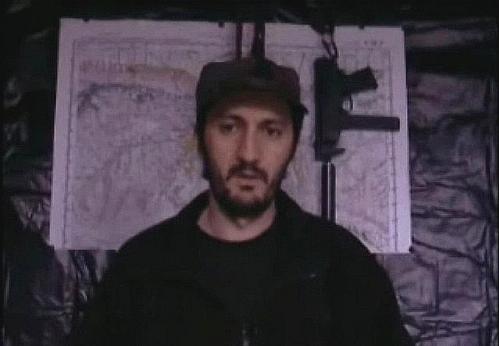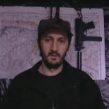
Exclusive Interview with Anzor Astemirov, March 2009
Publication: North Caucasus Weekly Volume: 10 Issue: 11
By:

Journalist Fatima Tlisova recently conducted an interview with Anzor Astemirov, who was the leader of Islamic militants in Kabardino-Balkaria and more recently became had of the Sharia courts for the Caucasus Emirate, the radical wing of the North Caucasian insurgency. The Jamestown Foundation believes the views of this controversial figure will be of interest to readers of the North Caucasus Weekly. However, publication of the interview does not in any way constitute an endorsement of the views expressed in it.
—————————
Exclusive Interview with Anzor Astemirov, March 2009
Anzor Astemir (ov), aka Saifullah (The Sword of Allah), 32, is the Amir (leader) of Kabarda, Balkaria and Karachai, also appointed as the head of the Court of Caucasian Emirate by Chechen leader Dokku Umarov. He is known as the developer and promoter of the idea of the Caucasian Emirate, which is considered by observers as the main political trend in the Caucasus today. Astemirov is a Circassian prince whose ancestors once ruled Kabarda.
— Fatima Tlisova
—————————
TLISOVA: In a recent article in Central Asia-Caucasus Institute Analyst (VOL. 11 NO. 3, FEBRUARY 11, 2009) you were characterized as a new generation leader, more politician than military commander. The author gives credit to your intellectual leadership and high popularity among youth. He underlines that your political talent makes you the one with whom everyone who has interest in the North Caucasus must be prepared to deal in the near future. In comparison with Dagestan and Ingushetia, your vilayet remains more or less stable. Is that the sign of your military weakness or of your political strategy?
ANZOR: Most of the observers are far from understanding that the basic structure of our jamaats is different from the structures of many other well-known groups like Hamas etc. … We do not have divisions in the leadership. Religious, political and military leadership is concentrated in the hands of Amir. He is responsible for decision-making.
As for stability in the vilayet, in the structure of the Emirate, we work according to a different program, which does not stipulate military activity at the current stage. We do not practice excessive violence except when necessary. We do not see enemies in the local population. We prefer to turn people toward the true path rather than to kill them. We know our enemy very well. These are the Russian Special Forces troops (GRU) based in sanatoriums of Nalchik, equipped with the best modern military and spy equipment and their agents camouflaged as locals. Of course they have set up a network of local traitors and informers. Nevertheless, we also have our people inside their locations and the names of the traitors do not remain a secret for long.
Besides, when writing about the situation, one must analyze the political and social environment of the region, which is not easy because information about the jamaats’ military activity is the subject of a taboo in the media. As well as [information about] continued violations of the religious and basic human rights of local civilians. Although we provide more operations with more success than outside observers can see in news reports. A major portion of the population of so-called Kabardino-Balkaria and Karachaevo-Cherkessia either latently or openly supports us. The regime does not leave people any other mechanisms of resisting violence besides armed struggle. Thus, those who have decided to resist are joining our ranks. We also do have plans for future operations that I cannot announce yet.
TLISOVA: The word was spread that the GRU’s hunters managed to entrap you into the ambush and directly attacked you not long ago. What happened?
ANZOR: We are at war, and it happens that we are ambushed. They opened extensive fire from 20 meters distance but I escaped without any damage. We all are in the hands of Allah. He takes care of his soldiers. Again, we are in a war.
However, not every loss of ours is due to military reasons. This winter we have lost a very dear fellow and long-time supporter—General Sultan Sosnaliev, known among the Caucasian underground as Abu Murat. Sultan came from a Circassian noble family. Officially, he was a high-ranking Russian army officer. After retirement he played an important role in organizing the Abkhazian Liberation Army that won freedom for Abkhazia and later was appointed as the minister of defense in the government of Abkhazia. Just a few people were aware of his friendship with guerrilla leaders such as Shamil Basaev and others. I was much younger than Sultan but we were very close as relatives and friends. I grew up knowing his mother and listening to his stories about the glorious resistance of our ancestors against Russian colonialism. Sultan was our brother by faith, our great advisor and strategist, for a long time. He dreamed to die on the battlefield but it was Allah’s predetermination that Sultan passed away from a serious illness. It is an irreparable loss for the Caucasian Emirate.
TLISOVA: For many Circassian nationalists Sultan Sosnaliev was a role model. Even for opponents of the idea of resistance against Russia, not to mention those who absolutely do not accept the idea of the Caucasian Emirate. Your statement about Sultans’ involvement can cause a storm of distrust.
ANZOR: Allah chooses who can fight for his faith and freedom and who can easily live enslaved. I fulfilled Sultan’s last will.
TLISOVA: On March 10th the Ministry of Interior (MVD) of Kabardino-Balkaria announced the re-activation of the special operation called “Weapon.” The point is that the MVD buys unregistered weapons from civilians. The announcement gave the results of similar previous operations. According to these reports, around 2 million rubles (about $800,000) were spent by the MVD during such operations in 2006-2008 operations (https://47.kavkaz-uzel.ru/articles/150633). Does your information coincide with that of the MVD?
ANZOR: It is true about the money but not about the results. The results are only on paper, are needed for propaganda purposes. People do not give the MVD anything except old rifles that have been hidden since World War II and that cost 10 rubles. They prefer to keep serious guns like pistols for their own safety. Besides, for a Makarov pistol, for instance, the MVD pays 10,000 rubles (around $280); we pay 35,000 to 55,000 [rubles] ($845-$1400) depending on their condition. Moreover— and this is noticeably important—in contrast to the MVD we never ask: where did you get this gun? Whoever he is, he does not risk becoming a subject of criminal investigation or even going to jail. As a result, we have the guns, the MVD spends the money.
TLISOVA: You must be wealthy enough to be able to give people more money for the guns than the MVD does. In his statement on January 29, 2009, the top commander of the anti-terrorism operation in the North Caucasus, General Arkady Yedelev, disclosed that guerilla groups in the region receive tremendous financial and supplemental support from Arab and Western countries (https://www.waronline.org/terrorism/financing-terror/). Is that true?
ANZOR: Financial support from the West or Arab countries is an absolute lie and a myth. If we received any support—even meager, not to mention significant—we would be much more successful in all respects. We created and systematized internal support techniques, and Sharia gives us clear rules for collecting military zakat (taxes). We prepared regulations and orders, which were distributed on our territories by our naibs (deputy commanders). In today’s situation, financial or any other types of support are no longer voluntary actions but fard ‘ain (compulsory) for every true Muslim because we are in war. We do not take anything that is above a fixed percentage rate, we do not rob poor families or those who suffered from the regime; instead, we support them as much as we can afford. For those who deny obeying the law, accepting their duty, we do use various penalties, including physical threats or even death. However, we prevent our people from unnecessary violations; we always recommend beginning with persuasion by the word rather than by the gun.
TLISOVA: On your new website (www.islamdin.com) there is posted a simplified project for the economic survival or even success of the Caucasian Emirate as an independent state. According to the project, the natural sources of the region are sufficient for it to become a wealthy state if they are handled intelligently. One of the basic elements of an economy is export or trade. You announced that the Caucasian Emirate will live under Sharia law. Does Sharia allow you to trade with non-Muslim states?
ANZOR: There is obvious theological evidence and examples from the life of the Prophet (salah Allah Alih Wa Salam) that allow us to have trade and economic relationships with any state that does not violate the rights of its Muslim citizens or is not in war with any Muslim country. As soon as the worst state in the world that we have to deal with will be not able to control the Caucasus anymore, the Caucasian Emirate will revive and prosper, Insha’Allah.




